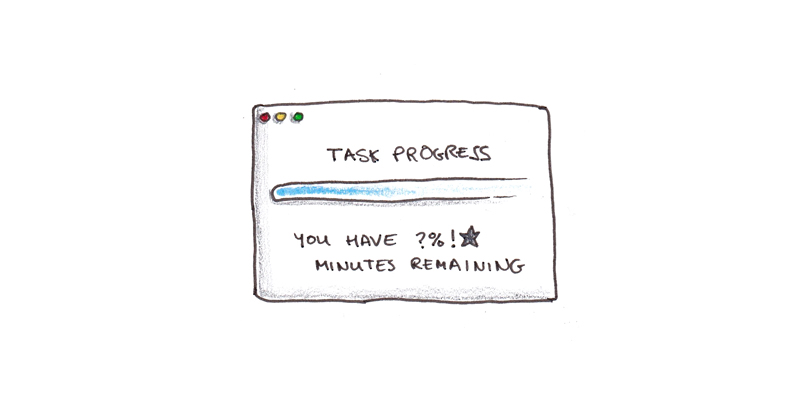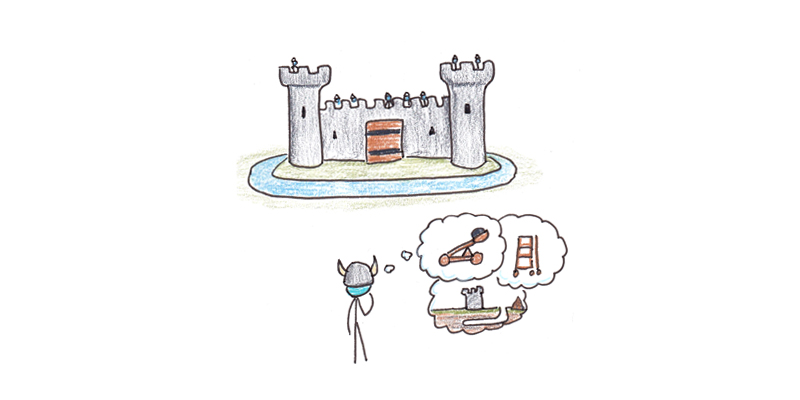Human beings crave progress. That craving distorts what we work on. Vital pursuits with less tangible progress are frequently sidelined for trivialities we can check off a to-do list.
Think of the last time you updated your computer. Just having the progress bar made the wait more bearable. The inching left to right may have been inconsistent. It may have been downright misleading, as the frustration at witnessing it stall forever at exactly 99% can attest.
But imagine how much harder it would be to wait if the progress bar weren’t even there.

Progress itself is good. But it is more easily measured in some pursuits than others. This leads to tractability bias—the tendency to focus on pursuits with more conspicuous progress.1
An example: last week I was working on a new book proposal. Writing the opening chapter was hard. I’d end some days thinking, “Well, at least this time I got to 1500 words before deciding to throw it all in the trash.”
In the same time, I could have easily written three or four essays for this blog. Except, writing a new book has much greater potential than even a brilliant essay. Had I written the essays I would have felt productive. It just would have been on something that mattered much less.2
Sieging the Castle
My friend, Cal Newport, has likened the theorem-proving efforts of a computer scientist to sieging a castle.3 First you try the front gate, and get repelled. Then you try the ramparts on the side. You dig tunnels and construct battering rams. Progress is zero until you finally break through.

Morale is a perennial issue for besieging generals. Frustrations and fatigue mount with each failure. If success doesn’t arrive quickly, many armies will simply abandon the fight. It’s easier to plunder the countryside, even if it will never lead to a lasting conquest.
The choice between easy raids and hard sieges appears in our work as well. The routine tasks to tick off versus the real work that makes your career.
Tractability is Inversely Related to Opportunity
Tractable tasks are easier. But that also means there is more competition. Paul Graham argues this is a major factor behind the success of companies like Stripe:
For over a decade, every hacker who’d ever had to process payments online knew how painful the experience was. Thousands of people must have known about this problem. And yet when they started startups, they decided to build recipe sites, or aggregators for local events. Why? Why work on problems few care much about and no one will pay for, when you could fix one of the most important components of the world’s infrastructure?
…
Though the idea of fixing payments was right there in plain sight, they never saw it, because their unconscious mind shrank from the complications involved. You’d have to make deals with banks. How do you do that? Plus you’re moving money, so you’re going to have to deal with fraud, and people trying to break into your servers. Plus there are probably all sorts of regulations to comply with. It’s a lot more intimidating to start a startup like this than a recipe site.
A recipe website is tractable. Break it down, code up the features and you’re done. Creating a payment platform is not. But, if you can slog through the difficulties, the space is more valuable because the competition is sharply reduced.
Not all important work is intractable. But it is the intersection of intractability and importance that stymies us. Paying deliberate attention to that overlap matters because we’re more likely to neglect it.
Making the Real Work More Tractable
It’s hard to feel progress when sieging a castle. You may have failed in the last attempt, and in doing so learned one more thing that doesn’t work. But how many more failures are still to come? Will breakthrough eventually be forthcoming? There’s no progress bar because the distance is still unknown.
But I think there are efforts we can make in our productivity systems to shift away from the easy satisfaction of checking off to-do items.
One strategy is to elevate the status of your sincere attempts. If your day is measured primarily in words written rather than hours of writing, this naturally pushes to more tractable tasks.
Another is to narrow what counts as the “real” work. I’ve found keeping a deep work tally enormously helpful. It prevents me from counting emailing, calls and other activity in a way that distorts away from more central challenges.
Finally a key to combat tractability bias is simply to stop tracking. If a metric misleads, it may be better to stop paying attention to it. If counting the number of books you read is keeping you from the longer, more important works—stop counting. If tallying up Twitter likes is keeping you from writing deeply-researched prose—stop tallying. If collecting citations is keeping you from writing your thesis—don’t track the total.
Real progress occurs when we hold the maxim that it is better to fail at what matters than to succeed at something trivial.
Footnotes
- I can’t take credit for this term. A reader used it when commenting on my essay Do the Real Thing, but I’m not sure where he got it either.
- This isn’t to imply essays are always lesser than books. Simply that, in my case, having written over 1500 essays, I would move closer to my writerly aspirations by working through the difficulties of another book.
- Cal discusses this in a private lesson in our Life of Focus course.

 I'm a Wall Street Journal bestselling author, podcast host, computer programmer and an avid reader. Since 2006, I've published weekly essays on this website to help people like you learn and think better. My work has been featured in The New York Times, BBC, TEDx, Pocket, Business Insider and more. I don't promise I have all the answers, just a place to start.
I'm a Wall Street Journal bestselling author, podcast host, computer programmer and an avid reader. Since 2006, I've published weekly essays on this website to help people like you learn and think better. My work has been featured in The New York Times, BBC, TEDx, Pocket, Business Insider and more. I don't promise I have all the answers, just a place to start.